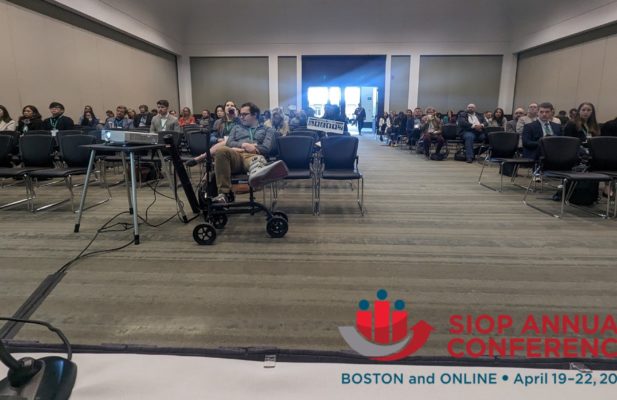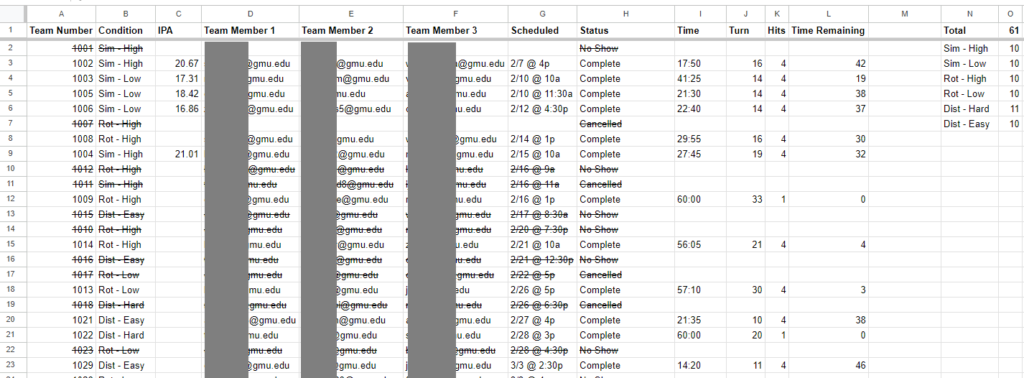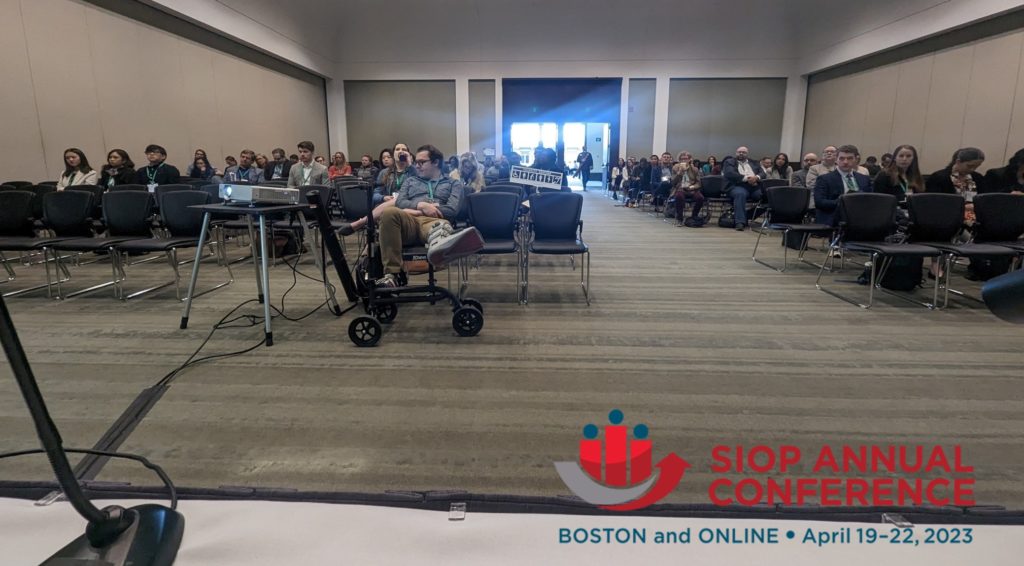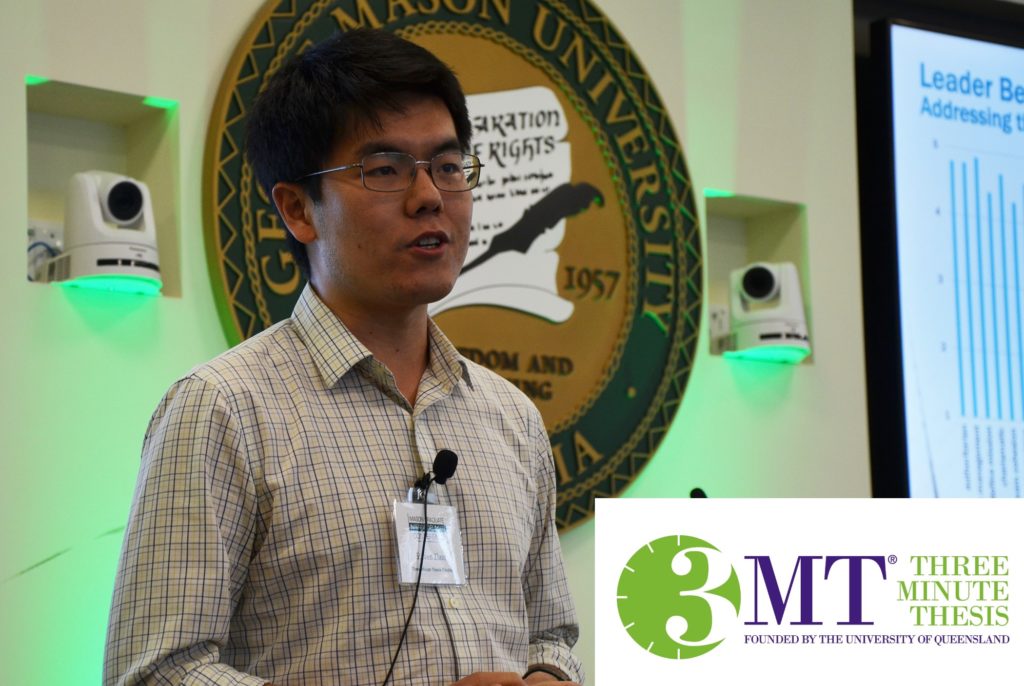
The good news: I’ve finished data collection for my dissertation! The bad news: It meant I had to schedule 60+ teams for 75 minute Zoom calls each, all while working the full-time Purdue job. In other news, I’ve added some resources based on presentations I gave at SIOP 2023, we hired a part time Graduate Research Assistant for a research grant I received, and I’m grateful to share some recent ‘wins’ in my academic work. Read on to hear more!

I brought this onto myself, for sure. Trying to get undergraduates to provide me with their availability, finding groups of three with shared availability, then ensuring everyone shows up on time… My cancellation rate was something like 40% of all sessions had a no-show. But I’m done! (Well… technically, my dissertation committee might come back and ask me to collect more data. But I’m fairly confident that won’t happen, the methods I’ll be using are actually computational modeling – specifically, agent-based modeling – rather than traditional multilevel SEMs that need larger samples.)
Thankfully, two lifesavers were the past few weeks were: (1) I received the SIOP Graen Research Grant for this dissertation, which allowed me to open up data collection to paid participants, and (2) one of my closest friends happened to have some extra daytime availability, so he was able to help run sessions while I was working my Purdue job (and thanks to the grant, I was able to compensate him for his time). After many headaches, I finally was able to recruit a substantial number of participants through CloudResearch Connect. They’re even offering no fee data collection for the first 30 days! I got excellent data from that platform; I highly recommend checking it out.

While juggling data collection and a full-time job, I also spent a few days in Boston for SIOP 2023. Unfortunately due to all the other commitments I had, I couldn’t attend very many sessions. Next year, I’ll be sure to take time off for it (or negotiate it as professional development 😅). But this year, I focused on the two sessions I presented at and the various networking opportunities.
I’ve posted the slides from my presentations on the website. The first was a symposium on the academic-practitioner gap. My fellow PhD students at GMU and I presented a paper where we downloaded abstracts and “practical implications” sections from popular I-O/management journals, then gave them to small business owners to ask them how relevant and/or feasible the research findings were. Our goal was to test our hypothesis that most top-tier I-O research focuses too much on big businesses and would produce findings that aren’t relevant or recommendations that aren’t feasible for small businesses with limited resources.
The second was an interactive workshop on academic administration careers for I-O PhDs. My collaborator (an I-O practitioner at the University of Minnesota) and I laid out our vision for a “third path” in between the classic academic vs. practitioner career paths that many I-O PhDs choose between. We believe that academic administration is a fruitful career path for I-Os, given that it neatly blends both academic work and practitioner work, allowing people to stay in academic setting without taking the traditional tenure-track research route. Moreover, we emphasized through our workshop how many challenges in academic administration would benefit from having I-O expertise.

In other exciting news, I received a $25,015 research grant from the Free Inquiry Grant Program to study journal publication bias! The goal of my proposed study is to investigate the extent to which journal publishing limits academic research in a way that might disadvantage underrepresented scholars from minority backgrounds and/or perspectives and viewpoints.
For example, we’re interested in seeing if scholars who are researching topics that are not well represented in the literature (e.g., certain approaches to improving diversity education) find it more difficult to publish in top-tier journals. If so, then it would ultimately be much more difficult for such scholars to ultimately attain tenure, since tenure at research universities still primarily focuses on research output. This could lead to downstream effects that limit the effectiveness of universities’ efforts to diversify their faculty, if underrepresented faculty find that they ultimately have more trouble publishing in top-tier outlets than other faculty.
We plan on collecting data from thousands of journal articles, conducting natural language processing to analyze the content of these articles, linking it to journal metrics (e.g., impact factors, citations), and linking it to author demographics and institutional metrics. Put together, we hope to better understand the publishing landscape and how it might (or might not) disadvantage certain groups of faculty.
The grant is primarily going towards hiring graduate research assistants and paying for the cost to access certain proprietary data sources. Our first research assistant started this week! We’ll be looking for another one later in the Fall, so stay in touch if you’re interested in the opportunity!

OK, last update, I promise. I’m grateful to share that I won George Mason University’s Three-Minute Thesis (3MT) competition this year! This is a competition held at universities worldwide where graduate students have to summarize their research in three minutes for a public, non-specialist audience. I spoke on my study on latent profile analysis of leader behaviors, which was a challenge but very meaningful experience to summarize in three minutes!
I can’t imagine how the judges were able to evaluate us. Everyone in the final round was phenomenal, and we had such disparate topics: I competed against a student researcher cancer prevention, another on animal welfare, and another on a well-known literary novel. I guess that’s what makes this an interdisciplinary competition!
This particular research project actually just received a second round revision from the Journal of Organizational Behavior. We’re being asked to revise a lot again, but we’re hopeful that it’ll eventually make it all the way to being published!
Thanks for reaching all of these updates. I hope that the work I’m involved in is interesting, that you enjoyed the read, and that you’ll subscribe to stay in touch!
Until the next update,
Steven Zhou
Comments (0)